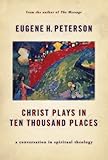Christ Plays in Ten Thousand Places : a conversation in spiritual theology / Eugene H. Peterson
Material type: TextPublication details: Grand Rapids, MI : William E. Eerdmans Publishing Company, c2005.Description: xii, 368 p. ; 24 cmISBN:
TextPublication details: Grand Rapids, MI : William E. Eerdmans Publishing Company, c2005.Description: xii, 368 p. ; 24 cmISBN: - 0802828752
- 9780802828750
- 9780802862976
- 0802862977
- 248.4 22 PET
- BV4501.3 .P475 2005
| Item type | Current library | Call number | Status | Barcode | |
|---|---|---|---|---|---|
 Books
Books
|
Bishop Bukenya Library Open Access / General collection | 248.4 PET (Browse shelf(Opens below)) | Available | 159806 |
Includes bibliographical references (p. 343-353) and indexes.
Christ plays in creation -- Exploring the neighborhood of creation -- Kerygma: Jesus' birth -- Threat: gnosticism -- Grounding text (1): Genesis 1-2 -- Grounding text (2): St. John -- Cultivating fear-of-the-Lord in creation: Sabbath and wonder -- Christ plays in history -- Exploring the neighborhood of history -- Kerygma: Jesus' death -- Threat: moralism -- Grounding text (1): Exodus -- Grounding text (2): St. Mark -- Cultivating fear-of-the-Lord in history: Eucharist and hospitality -- Christ plays in community -- Exploring the neighborhood of the community -- Kergyma: Jesus' resurrection -- Threat: sectarianism -- Grounding text (1): Deuteronomy -- Grounding text (2): Luke/Acts -- Cultivating fear-of-the-Lord in community: Baptism and love
"Christ Plays in Ten Thousand Places reunites spirituality and theology in a cultural context where these two vital facets of Christian faith have been rent asunder. Lamenting the vacuous, often pagan nature of contemporary American spirituality, Eugene Peterson here firmly grounds spirituality once more in Trinitarian theology and offers a clear, practical statement of what it means to actually live out the Christian life."--Jacket
In this first and foundational volume of a five-volume series, Peterson rescues spirituality from both its ancient connotations of cloistered monasticism and its modern contamination with self-help boosterism and neopagan recreation. No dogmatic catechist, Peterson invites his readers into a true dialogue--speaking and listening in turn--that opens up Christian spirituality as a lived reality. Though grounded in scripture and in Trinitarian doctrine, the spirituality Peterson would foster is deeply experiential, intensely felt as a growing awareness of both transcendent miracles and intimate connections. That growth comes not through personal achievement but rather through selfless submission to the divine presence, memorably described in the Gerard Manley Hopkins poem from which Peterson takes his title. Allowing the Lord to play in us, Peterson promises, will nurture receptivity to the wonders of creation as we recognize in Christ's birth the revelatory key to the universe and as we reverence the Sabbath as a weekly day of renewal. Richly ecumenical, Peterson's reflections will attract Christians from diverse affiliations. --Bryce Christensen Copyright 2005 Booklist
There are no comments on this title.
